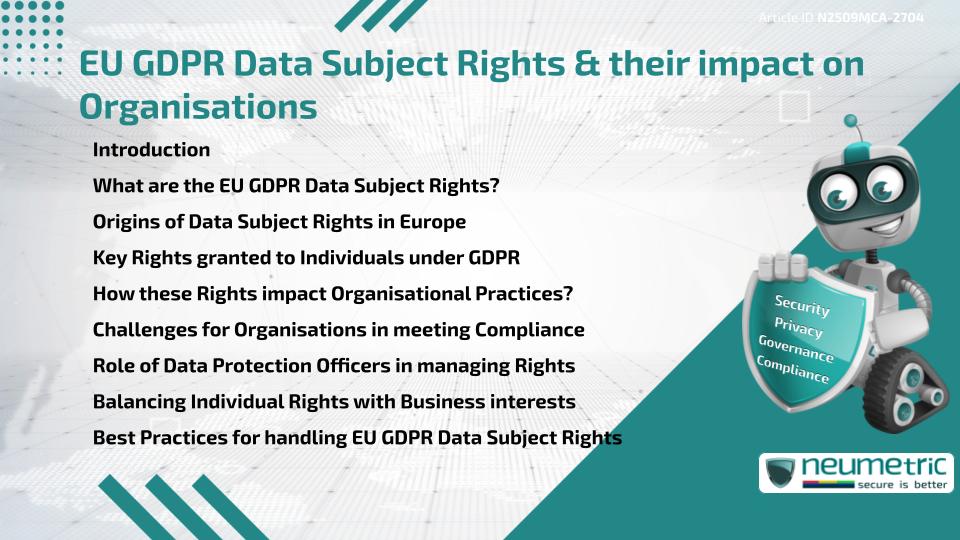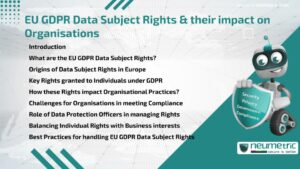Table of Contents
ToggleIntroduction
The EU GDPR Data Subject Rights form the cornerstone of the General Data Protection Regulation [GDPR], shaping how Individuals interact with Businesses that process their Personal Data. These Rights empower people to access, correct, delete, restrict & transfer their data, among other protections. For Organisations, the impact is profound: they must adopt transparent processes, update Policies & invest in Data Governance Systems to remain compliant. Non-Compliance not only Risks Financial penalties but also damages Consumer Trust & Corporate Reputation.
What are the EU GDPR Data Subject Rights?
The EU GDPR Data Subject Rights are a set of legal entitlements that Individuals hold over their Personal Data. These include the Right to be informed, the Right of Access, the Right to Rectification, the Right to Erasure, the Right to Restrict Processing, the Right to Data Portability, the Right to Object & Rights related to Automated Decision-making. These Rights aim to give Individuals meaningful control over how their Personal Data is used & shared.
Origins of Data Subject Rights in Europe
Europe’s emphasis on Privacy predates GDPR. The Data Protection Directive of 1995 introduced the concept of Rights for Individuals in relation to their Personal Data, but enforcement & consistency varied across member states. GDPR, which came into effect in 2018, harmonised these protections & elevated them into binding law across the EU. The EU GDPR Data Subject Rights therefore represent both continuity with past principles & a strengthening of Individual protections in the digital age.
Key Rights granted to Individuals under GDPR
The Regulation grants several Rights that Organisations must respect:
- Right to be Informed: Individuals must be told how their data will be used.
- Right of Access: Individuals can request copies of their data.
- Right to Rectification: Incorrect or incomplete data must be corrected.
- Right to Erasure: Also called the “Right to be forgotten,” Individuals may request deletion of their data under certain conditions.
- Right to Restrict Processing: Data can only be processed under limited circumstances.
- Right to Data Portability: Data must be provided in a structured, machine-readable format so Individuals can transfer it elsewhere.
- Right to Object: Individuals can object to processing, especially for Marketing purposes.
- Rights on Automated Decision-making: Individuals can challenge profiling or fully automated decisions that significantly affect them.
How these Rights impact Organisational Practices?
For Organisations, the EU GDPR Data Subject Rights mean implementing clear, accessible procedures for handling requests. Companies must respond to most requests within one (1) month, which requires coordination across IT, Legal & Compliance Teams. Data mapping, System integration & Staff training are critical. Many Organisations also need to adapt Marketing strategies, Retention Policies & Consent mechanisms to ensure that Rights can be effectively exercised.
Challenges for Organisations in meeting Compliance
Meeting these requirements is not without difficulties. Responding to requests can be Resource-intensive, especially for Organisations handling vast amounts of data. Businesses must also verify the identity of requesters without creating barriers to their Rights. In addition, balancing the Right to erasure with Legal obligations to retain records poses complex Legal & Operational challenges.
Role of Data Protection Officers in managing Rights
A Data Protection Officer [DPO] often plays a central role in ensuring that Organisations comply with the EU GDPR Data Subject Rights. DPOs oversee Policies, handle complex requests & liaise with Supervisory Authorities. Their expertise helps Organisations navigate the fine line between Individual Rights & Operational requirements, providing a structured approach to Compliance.
Balancing Individual Rights with Business interests
While these Rights strengthen Individual autonomy, Organisations often argue they impose heavy Administrative & Financial burdens. For example, frequent Access or Erasure requests can strain Resources. Nonetheless, respecting these Rights enhances Consumer Trust & demonstrates Accountability. Organisations that align Compliance with Customer-centric practices often find that the benefits outweigh the costs.
Best Practices for handling EU GDPR Data Subject Rights
Organisations can strengthen their Compliance efforts by:
- Maintaining accurate Data Inventories & records of processing
- Establishing clear Internal Workflows for request handling
- Training Staff to recognise & respond to Rights-based queries
- Implementing user-friendly self-service portals for Data Access & Management
- Regularly reviewing & updating Privacy Policies to ensure Transparency
Takeaways
- GDPR grants Individuals eight core Data Subject Rights
- Organisations must respond to most requests within one (1) month
- DPOs are key in managing Compliance & Communication
- Balancing Rights & Legal obligations remains a challenge
- Training, Workflows & Transparency are essential for success
FAQ
What are the EU GDPR Data Subject Rights?
There are eight Rights under GDPR that give Individuals control over their Personal Data, including Access, Erasure, Rectification & Portability.
Do Organisations have to comply with all Rights requests?
Yes, unless an exemption applies, such as Legal obligations that require Data Retention.
How long do Organisations have to respond to Requests?
Most requests must be addressed within one (1) month, with possible extensions for complex cases.
What is the Right to be Forgotten?
It allows Individuals to request the deletion of their Personal Data under specific circumstances, such as withdrawal of Consent.
Who ensures that these Rights are respected?
Supervisory Authorities in each EU member state oversee Compliance & can impose Fines for Violations.
Can Businesses outside the EU be subject to these Rights?
Yes, if they process the Personal Data of EU Residents, they must comply with the EU GDPR Data Subject Rights.
What role does a Data Protection Officer play?
A DPO ensures Compliance, manages Rights Requests & acts as a point of contact with Regulators & Data Subjects.
Do these Rights apply to Automated Decision-making?
Yes. Individuals can object to or request Human review of decisions made solely through automated processing.
Need help for Security, Privacy, Governance & VAPT?
Neumetric provides organisations the necessary help to achieve their Cybersecurity, Compliance, Governance, Privacy, Certifications & Pentesting needs.
Organisations & Businesses, specifically those which provide SaaS & AI Solutions in the Fintech, BFSI & other regulated sectors, usually need a Cybersecurity Partner for meeting & maintaining the ongoing Security & Privacy needs & requirements of their Enterprise Clients & Privacy conscious Customers.
SOC 2, ISO 27001, ISO 42001, NIST, HIPAA, HECVAT, EU GDPR are some of the Frameworks that are served by Fusion – a SaaS, multimodular, multitenant, centralised, automated, Cybersecurity & Compliance Management system.
Neumetric also provides Expert Services for technical security which covers VAPT for Web Applications, APIs, iOS & Android Mobile Apps, Security Testing for AWS & other Cloud Environments & Cloud Infrastructure & other similar scopes.
Reach out to us by Email or filling out the Contact Form…





